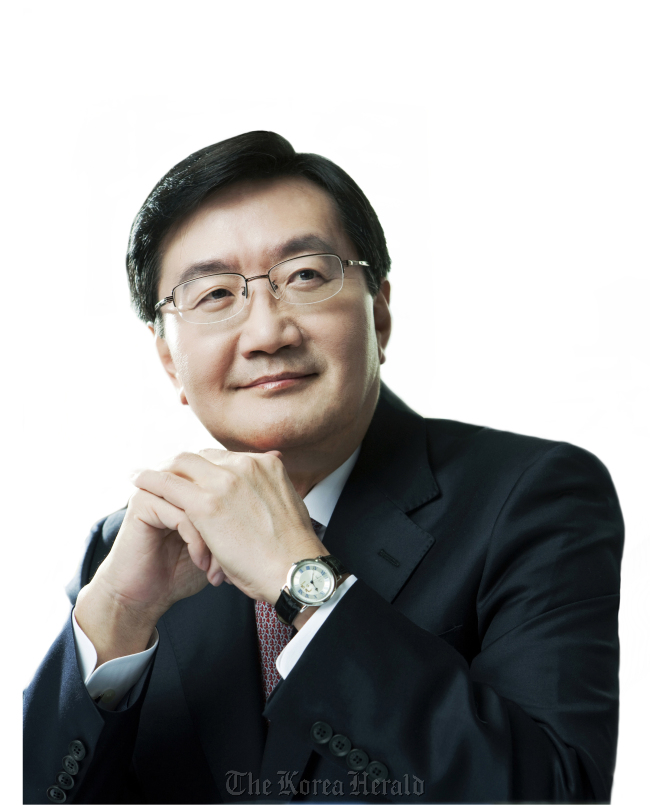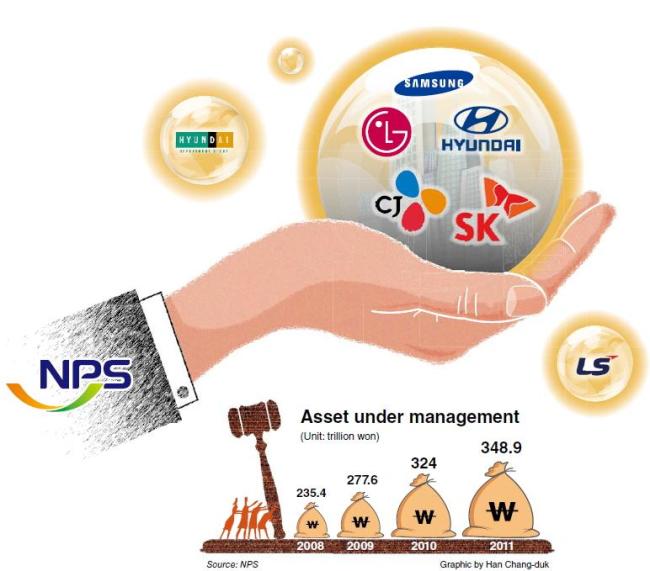The National Pension Service, the country’s pension fund manager, has been increasingly called upon to carry out duties for the markets, becoming more than a mere manager of public money investing in safe assets.
Whether it is stabilizing the stock market as it did at the height of the global financial crisis in 2008 or providing support to Korean companies for cross-border mergers and acquisitions, the NPS will likely once again emerge into the spotlight as a savior of sorts ― this time, for the incoming government of President-elect Park Geun-hye.
Pledging to be a president for the middle class and for small and medium enterprises, Park vows to bring order and root out unfairness, imbalances and unreasonableness in the Korean market dominated by family-run conglomerates.
 |
CEO Jun Kwang-woo |
Her policy paper suggests strengthening the voting rights of the NPS at notable blue-chip companies such as Samsung Electronics and Hyundai Motor, in which the state-run pension fund owns considerable shares of over 5 percent, and giving it further independence in investment management.
This plan falls under the president-elect’s economic democratization policy that aims to boost antitrust regulations and protect the economically weak, minority shareholders, and consumers against big businesses.
The incoming government seeks to amend laws concerning pension fund operations so that the NPS can exert much more influence through shareholder advocacy of conglomerates to “improve their governance structures and prohibit them from further cross-shareholdings.”
This will lead to further debate about whether the government is promoting socialism through the pension fund rather than leaving it up to the market.
Analysts said that the NPS has been shown to be independent from the government in making investment decisions and exercising voting rights.
The role of the NPS, however, has been very limited compared with other global funds. For instance, it rarely has any shareholder engagement where it can raise its voice over matters concerning corporate governance improvement.
“The more pressing issue is whether the pension fund will be given an expanded role in a path that allows it to ‘actively’ exercise its rights as a shareholder,” beyond just casting yes or no votes at meetings, said Kang Jeong-min, a researcher for the Economic Reform Research Institute.
Controversy arose last February, when the NPS made the unprecedented decision to abstain from voting on the appointment of Chey Tae-won, the SK Group chairman who was then facing embezzlement charges, as a board member of SK Hynix.
This has led to criticism over the NPS’ reluctance to engage in shareholder activism in spite of public expectations.

The fund, with assets worth some 380 trillion won ($359 billion) under its management, is one of the prominent shareholders at more than 180 companies, mostly consisting of conglomerates, as of the end of March 2012.
Its corporate list is likely to expand, and its stakes in existing equity portfolios will increase as the pension fund seeks to boost stock investment, while reducing investments in fixed-income securities for higher returns in the long term as the number of people receiving a pension grows.
By 2016 to 2017, it seeks to increase its equity holdings both at home and abroad to 30 percent of total assets, bonds to less than 60 percent and alternative assets such as infrastructure and real estate to 10 percent, as part of diversification.
In 2011, its equity holdings accounted for about 23 percent, bonds 68 percent and alternatives 8 percent, while the rest was short-term investment assets, according to the NPS.
With President-elect Park strongly promoting economic democratization for the less fortunate, the market is eyeing what moves the pension fund will take at shareholders’ meetings at big companies such as Samsung Electronics, Hyundai Motor and NHN in which it has recently increased its stakes.
A spokesperson for the fund said that it could not comment on government policy. However, it said that the fund made decisions and cast votes through investment committees, driven by internal guidelines, based on the interest of the people who will rely on pensions later in life.
The NPS said it carefully took into account important factors such as potential returns and stability when investing in various assets.
By Park Hyong-ki (
hkp@heraldcorp.com)









